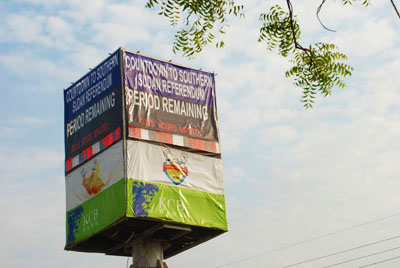
JUBA, Southern Sudan — It created quite a stir when Secretary Clinton said publicly that South Sudan secession is “inevitable.” Gradually, countries and bodies are acknowledging the likelihood that southerners will vote for secession and are preparing for the practical implications of the expected outcome. But even as people note how public opinion is trending, diplomats, officials, and analysts typically qualify remarks to avoid passing a judgment or endorsing secession ahead of the official process.
That subtlety is largely brushed over here in the southern capital as final preparations are underway for the vote, which the ruling party asserts will not be delayed by even one day, despite what it says are tactics by the northern National Congress Party to stall.
The countdown to independence is on – literally, in the glowing red digital clock in a central roundabout in town that ticks off the time left until January 9 in days, minutes, and seconds. And lest you interpret that the clock is a neutral reminder of the looming decision day, a banner mounted just below the clock sets things straight: “Vote for your freedom” with a picture of a pair of shackled hands cut free.
Last Sunday at the Catholic cathedral in town, anticipation of the referendum was woven throughout the English language service. With South Sudan President Salva Kiir sitting in the front row, the bishop delivered a sermon focused on repenting for past sins and starting afresh. During his announcements as the service ended, he asked the congregation, “Will I be a bishop of free people or of slaves? Will you choose Jesus or the devil?”
The annual beauty pageant to crown South Sudan’s “Miss Malaika” embraced the theme of independence as well. As young women from all 10 southern states strutted down the catwalk, the emcee extolled “the beauty of the New Sudan!” Many of the musical groups performing at the pageant were similarly clear about their preferences, such as one singer from the band called Southern Boys who revved up the large audience with a refrain that went, “Unity? No. Separation? Yes!”
After more than 20 years of civil war and a five-year interim period where the North and the South pledged to “make unity attractive,” it’s to be expected that people are enthusiastic about what lies beyond the vote they’ve long awaited, which today – as the countdown clock tells us – is now just 31 days away.
But thinking just slightly beyond the seven-day polling period, it’s not difficult to imagine a scenario where the southern government declares the process fair and credible, while the North raises sufficient complaints of irregularities to throw into question the legitimacy of the result.
Seeing how clear the will is of southerners – at least here in Juba but anecdotally throughout the South – it will be a shame if that resolve is challenged by questions of credibility that will inevitably be raised, whether justifiably or as attempts to muddy the process. For instance, the Referendum Act is clear that political parties must remain neutral and protect the right of southerners to freely express their will without interference. In anticipation that the polling period and month of counting will be closely scrutinized, both by the international community and the North, the southern government should ensure the letter of the law is followed to ward off allegations that might derail a clear-cut result.

